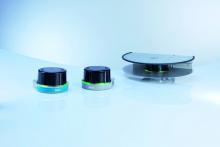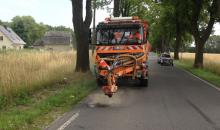Swiss firm Tinynode has launched a wireless detector to enable motorists to find vacant outdoor parking spaces.
The A4 wireless detector model is very easy to install onto the road surface, either with screws or glue. The B4 model is embedded in the road, flush with the surface, facilitating the passage of snow removal vehicles, for example, and meeting certain security regulations.

Swiss firm Tinynode has launched a wireless detector to enable motorists to find vacant outdoor parking spaces.
The A4 wireless detector model is very easy to install onto the road surface, either with screws or glue. The B4 model is embedded in the road, flush with the surface, facilitating the passage of snow removal vehicles, for example, and meeting certain security regulations.
The system relies on a network of sensors (one for each parking space) that use a magnetic detection technology to determine whether or not a space is occupied. Thanks to a patented radio communication protocol using the 868 MHz and 915 MHz frequency bands, the information is routed to a gateway. There, all the information from the zone is consolidated and then centralised in a database. The information can then be used for a diverse range of applications (such as guidance, signalling and reservation systems).
A leading company in truck detection for nearly ten years,7526 Tinynode is also updating ITS truck product range.
The first generation attracted major clients, particularly in Germany and France (Vinci Autoroutes Group). More than 2,000 detectors have been installed at thirty sites in Europe, numbers that are to double by the end of the summer.
The new high-sensitivity truck detector offers equivalent performance, with updated components and a longer lifetime. It is available in two models: the A4-H is placed at the surface while the B4-H is embedded in the asphalt.
The A4 wireless detector model is very easy to install onto the road surface, either with screws or glue. The B4 model is embedded in the road, flush with the surface, facilitating the passage of snow removal vehicles, for example, and meeting certain security regulations.
The system relies on a network of sensors (one for each parking space) that use a magnetic detection technology to determine whether or not a space is occupied. Thanks to a patented radio communication protocol using the 868 MHz and 915 MHz frequency bands, the information is routed to a gateway. There, all the information from the zone is consolidated and then centralised in a database. The information can then be used for a diverse range of applications (such as guidance, signalling and reservation systems).
A leading company in truck detection for nearly ten years,
The first generation attracted major clients, particularly in Germany and France (Vinci Autoroutes Group). More than 2,000 detectors have been installed at thirty sites in Europe, numbers that are to double by the end of the summer.
The new high-sensitivity truck detector offers equivalent performance, with updated components and a longer lifetime. It is available in two models: the A4-H is placed at the surface while the B4-H is embedded in the asphalt.







